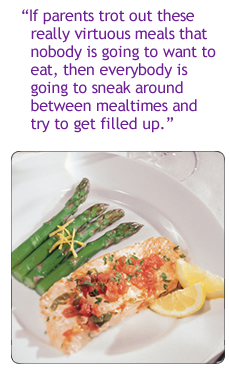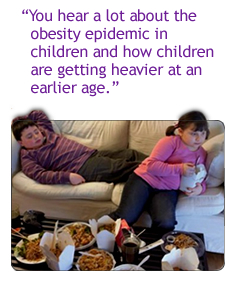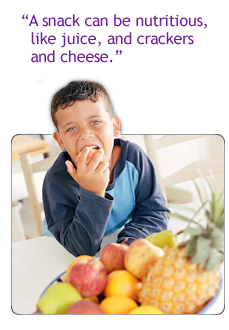  The following is part 2 of an interview with Ellyn Satter, author of numerous books on family nutrition, including Your Child’s Weight, Helping Without Harming. She has some ideas that may be different than what you have heard before -- read the interview, then let us know what you think.
Part 1 of this interview appeared in the April 2009 issue of Synergy. In Part 1, Satter talked with us about her method for curbing weight problems… let the child eat as much as they want. (But only at mealtimes!)
SYNERGY: What is the role of a good balanced diet, or is that not the most important thing to be worrying about?
ES: Definitely NOT the most important thing. In fact, I don’t talk about good food/bad food at all. I ask, "Is your family having meals together?" A lot of times parents will say, "No." I say, "Eat what you’re eating now, just have it at regular meals and snack times." I tell them to put the pizza on the table, get something to drink, call everybody, and sit down and eat it together. Don’t shock everybody by trying to eat different food than they are eating now.
If parents trot out these really virtuous meals that nobody is going to want to eat, then everybody is going to sneak around between mealtimes and try to get filled up. In the long run they could end up eating more, not less. If you are going to keep up with the enormous task of having family meals and structured snacks, those meals and snacks have to be richly rewarding for the parents to plan, shop for, prepare, and eat. Otherwise you are just not going to do it because it’s too much work for too little reward.
SYNERGY: Are there any special challenges with teens for this particular approach of being structured about the times?
ES: Parents ask me how they can get their teens to eat better, and it turns out that their teen has not been at the table since he has been 8 or 10 years old. That means it’s a pretty steep job to get him back to the table, and the only way he is going to come back to the table is if he wants to. So try to keep those family meals all along. Children and adolescents always do better if they continue to have family meals. They do better socially, emotionally, and academically, with weight management, drug use, early sexual behavior -- all those things are better if kids have family meals.
 SYNERGY: Is it feasible to set rules that the teen can’t come in and just get something to eat out of the kitchen whenever they want to?
ES: Well the first thing you do is expect the teen to make family meals a priority. That builds on what he learned as a school-aged child. During those school years you gradually turn over snack planning to the child. But have the rule to snack right after school so you don’t spoil your dinner, and no munching along with your homework. You expect him to manage his snacking so he’s able to come to the table hungry. He manages his time so he doesn’t schedule things at dinner time. And that’s a real important principle in terms of preparing him for adult life.
SYNERGY: You hear a lot about the obesity epidemic in children and how children are getting heavier at an earlier age. What is your thought about the cause of the problem?
ES: The increase in overweight children is because (a) family meals are eroding, and (b) children are being restricted deliberately to try to keep them from becoming overweight.
SYNERGY: What about the role of physical activity? When I was a kid, we were active all the time, your friends were always outside, you would just run out there and play with them. Kids don’t seem to do that as much anymore.
ES: I talked about the division of responsibility in feeding -- and there’s also a division of responsibility in activity. The parents must take responsibility for providing the child with safe places to be active, and then it’s up to the child to decide what and how much activity they are going to do.
However, while an important part of parenting is turning off the TV set, you can’t control your child’s size or shape by making them active. You have to let your child grow up to get the body that is right for him or her. If feeding is distorted, or if parents put a lot of pressure on the child about activity, then that child is likely to grow up overweight.
The basic idea is Zen -- stop controlling, stop struggling, stop worrying, and you change the very nature of the problem.
SYNERGY: Children are all different -- one kid goes for the gusto and eats everything enthusiastically, and the other child just sits there and night after night refuses to eat their vegetables.
ES: My language would be not taking interest in vegetables.
SYNERGY: Your principle is that their bodies inherently know what to do. You trust that it’s all going to work out for the best because they will develop better habits over time. And they will naturally take a relatively healthy route.
ES: You are trusting that your child wants to grow up with eating, that they want to grow up to eat the foods that you eat. And of course they do because your children idolize you. They look at you and say, this is what I’m going to do when I get older. So even if they don’t do it today or tomorrow or even for years, eventually they are going to get around to doing it. The other thing you trust them to do is to know how hungry and how full they are. Trust that the child’s hunger and fullness are related to their metabolism, to their potential for growth. Trust that they will eat as much as they need to grow.
SYNERGY: Their body knows how much food they need.
ES: Right.
 SYNERGY: I’m definitely the parent who says, "Eat your vegetables." I’ve got it really grained into me that you need to give them healthy food, they don’t know what’s right for them, and they would eat candy all day long if you let them.
ES: How do you feel when you have to be so hard nosed?
SYNERGY: The overarching feeling is frustration, but I understand the child’s perspective. When I was a kid I didn’t like to eat a lot of things my mother put in front of me. There are always a couple of things you kind of have to gag down. But as a parent you say, "Oh come on now, just eat the thing already. You’re making too big a deal out of it. You’re making it 10 times worse for yourself. You would be better off if you just ate it and could go play and have fun, but you’re being stubborn and you’re just sitting there refusing to put the thing in your mouth." So that’s the routine you go through every night. It doesn’t work very well.
ES: How do you feel about just saying, "We’ve been trying to get you to eat your vegetables, but you’ll get around to it when you’re ready. In the meantime, I’m not going to try to make you anymore."
SYNERGY: I think it’s a very interesting concept. I’ll give it a shot.
ES: There’s doing, or not doing. There is no giving it a shot. It could take her a long time before she gets ready to eat the vegetables. You’re like a lot of parents in that you feel one of your obligations as a parent is to get her to eat her vegetables. As a feeding-kid guru, I will tell you that you don’t have to do that anymore.
SYNERGY: It feels counter-intuitive to say, "Okay, you don’t have to eat your vegetables" but then you can have your snack allotment.
ES: You’re struggling to get yourself out of the control mindset and into the trust mindset. A snack is not a treat. It is just a little meal. If you are going to have treats, I would have them at mealtime. A snack can be nutritious, like juice and crackers and cheese. It is one of the six feedings during the day, and you don’t use snacks to put leverage on the child to eat at any other time.
SYNERGY: On one level you realize as a parent that sitting there yelling at your kid every night isn’t really good parenting either.
ES: I work with parents and children who find their way to me when they are involved in such battles for control that the child is having serious difficulties; the child is gaining way too much weight way too fast, or the child is having a seriously inadequate diet.
These are really extreme battles for control. For parents to give up those battles takes steady nerves, and it takes a leap of faith. They think if it’s going this poorly when I’m putting all this effort into it, what’s going to happen when I stop? And to their astonishment the child’s eating improves when they stop being so controlling, when they start being more trusting.
SYNERGY: Which of your books do you most recommend?
ES: I think Secrets of Feeding a Healthy Family is the best starting point. For weight issues, Your Child’s Weight is the place to go.
Let us know what you think. Weigh in and send us your feedback on Ellyn Satter’s approach to managing childhood eating habits to featuredstories@adamcorp.com
|